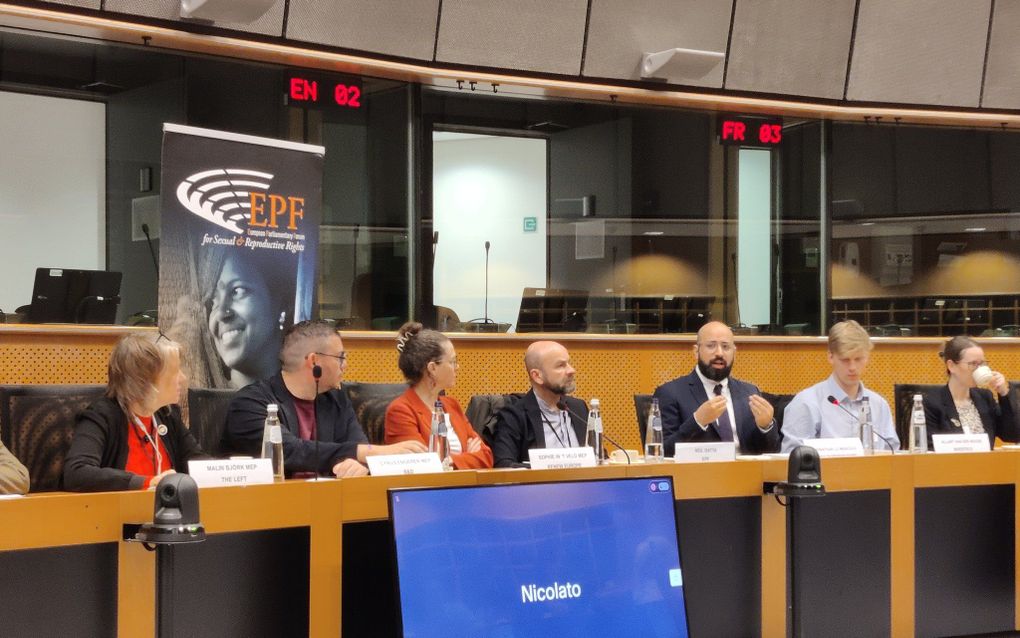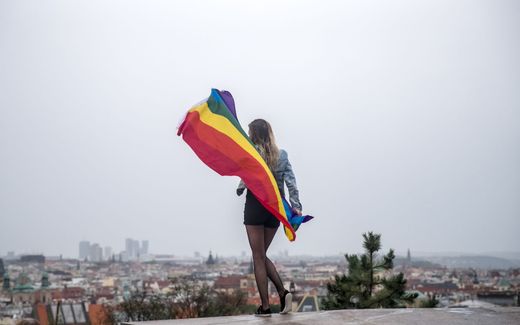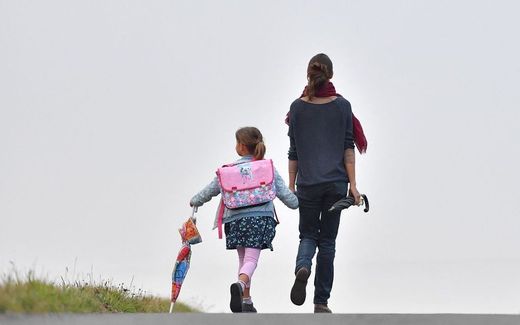Christian Right on the gain in Europe: Reason for hope or alarm?
05-04-2024
European Union
Cornelis Boon, RD

Meeting in European Parliament with Sophie in 't Veld presiding (3rd from left) and editor Lo Mascolo (3rd from right). Photo Twitter
European Union
Christian organisations are successful in spreading the anti-woke, anti-gender and Christian-nationalist agenda. That was the alarm that sounded in Brussels on Thursday.
At a conference at the European Parliament, the book “The Christian Right in Europe” was presented, a study of the “infiltration of the Christian right into national and international institutions”. This academic study on “ultra-conservative networks” is available online and describes the state of play in several European countries. The book was published in October last year already.
“A worrying trend,” Sophie in ’t Veld, MEP for Volt, called it that the Christian right in Europe is increasingly able to organise itself. On Thursday, she chaired a conference organised by the European Parliamentary Forum for Sexual and Reproductive Rights (EPF, a network of MEPs committed to LGBT rights) at the European Parliament, on which the book “The Christian Right in Europe” was highlighted. In the book, there are 20 case studies of European countries such as Hungary and Portugal, where the authors identify a growing influence of the Christian right on politics and society.

Political leaders, civil society actors and faith leaders argue against abortion rights, gay marriage and transgender rights while promoting a patriarchal traditional family model alongside democratic erosion and racist conspiracy theories, reads “The Christian Right in Europe”. In light of these developments, the book’s authors, edited by Gionathan Lo Mascolo, analyse the growing transnational network’s ideology, institutions, and strategies.
Umbrella
EPF director Neil Datta has seen a tipping point since 2013. Since that year, the Christian right in Europe is said to be increasingly able to mobilise. Among other things, Datta cites that the Christian network Agenda Europe organised its first meeting in London in 2013. Civitas Christiana, Vision Europe and the EU-wide political umbrella ECPM are other organisations. They are all increasingly able to organise themselves, Datta says.
According to Datta, organisations of the Christian right pretend to be civil society organisations. “But they are not grounded in fundamental human rights and pursue illiberal ideas”, the director states. “They are anti-gender, anti-woke and anti-abortion organisations.”
In ’t Veld adds: “Unlike normal civil society organisations, organisations of the Christian right do not seek publicity, but operate under the radar as much as possible.”
“When these Christian actors meet it’s not to discuss religion, theology or spirituality - it’s very much normative and political. They want to change the rules that affect people that do not follow their faith”. Neil Datta speaks about the Christian Right in the #EUbubble pic.twitter.com/ikFM0XY1GI
— EPF (@EPF_SRR) April 4, 2024
Religious wars
The Christian right is becoming increasingly far-right, Datta claims. “Ten years back, many transnational network leadership figures were in centre-right parties. Meanwhile, many leaders of the Christian right can safely be counted as belonging to the far-right flank.”
In ’t Veld refers to Donald Trump: “For me, it is exemplary that the US former president is now selling Bibles.”

“Christian nationalism is a key feature of the current Christian right,” agrees Gionathan Lo Mascolo, editor of the book. “This manifests itself, among other things, in xenophobia, emphasising the Christian character of a country and sometimes in outspoken support for Russia.”
An interesting development, Lo Mascalo believes, is that on the European continent, “what was centuries torn by wars between Protestants and Roman Catholics”, the two groups increasingly find each other around ethical policies. “They no longer focus on differences between them, but on what binds them in their cultural struggles,” he says. It reinforces Lo Mascolo’s assumption: “The Christian right is out to gain political power.”
In 't Veld: I hate pro-life. Organisations are against women's free choice

The book and the conference are meant “to raise awareness about the rise of the Christian right and mobilise counter forces”, In ’t Veld says. Accordingly, at the conference organised by EPF, only people who spoke out emphatically against the transnational network spoke. Phrases like “madness of traditional values” and “it touches me when the free right to abortion is curtailed” resound. In ’t Veld: “I hate pro-life. Organisations are not pro-life. They are against women’s free choice to choose abortion.”

But still, there also were “representatives of the Christian right” in the room, In ’t Veld noted. They include Christian MEPs Margarita de la Pisa from Spain and Ladislav Ilcic from Croatia. “Encouraging to hear that pro-abortion and pro-gender organisations in the European Parliament see our influence growing,” notes Ilcic after the conference, with a twinkle in his eye.
Why did the two politicians attend a conference that brings together representatives who want to attack their dearest values? “I want to understand their views,” says De La Pisa. “And I want to keep the discussion alive. We need to discuss the impact of woke and gender ideology on our European societies before we can fight it.”
The fight against woke and gender ideology should not be fought with fire and sword, Ilcic stresses. “I am convinced that we are on the right side and that they are wrong. But we must bring our truth with love and respect for our neighbour.”
Related Articles





